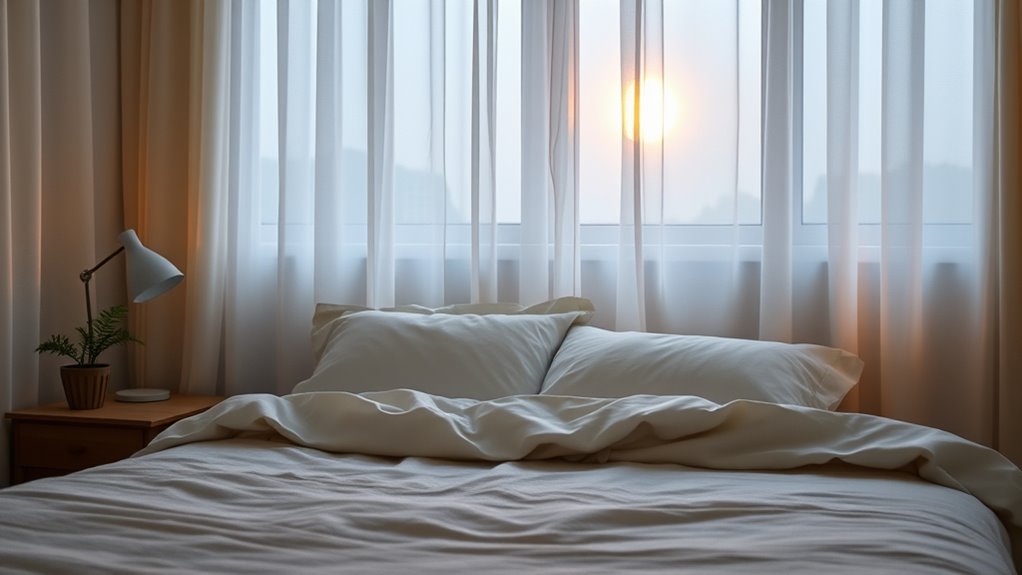To build a restorative routine that boosts your mental health, I recommend setting a consistent bedtime and avoiding screens before sleep. Creating a calming environment and relaxing pre-sleep activities like reading or stretching signals your body to wind down. Limiting caffeine and maintaining regular habits help improve sleep quality, supporting emotional resilience. Paying attention to your dreams and journaling them can uncover subconscious emotions. Keep exploring these tips to discover even more ways to enhance your rest and mental well-being.
Key Takeaways
- Maintain a consistent sleep schedule to regulate your internal clock and improve sleep quality.
- Establish calming pre-sleep routines, like reading or stretching, to signal your body to wind down.
- Minimize screen time and caffeine intake before bed to reduce disruptions and promote restful sleep.
- Keep your sleep environment peaceful and comfortable to support restorative rest and emotional well-being.
- Use dream journaling and analysis to process subconscious emotions, enhancing mental clarity and emotional resilience.

Have you ever wondered how a good night’s sleep can impact your mental health? It’s a question I’ve asked myself more times than I can count, especially during periods when I felt overwhelmed or anxious. The truth is, sleep isn’t just about feeling rested; it’s an essential component of emotional resilience and mental clarity. When I started paying closer attention to my sleep habits, I realized how much it influenced my mood, stress levels, and overall mental well-being. Building a restorative sleep routine isn’t just about clocking in hours—it’s about creating a foundation that supports my mental health every night.
Prioritizing good sleep habits boosts mood, resilience, and mental clarity—your foundation for emotional well-being every night.
One approach that’s helped me is understanding and practicing good sleep hygiene. Sleep hygiene involves simple habits that promote better sleep quality, like maintaining a consistent bedtime, avoiding screens before bed, and limiting caffeine intake in the evening. I found that establishing a calming pre-sleep routine, such as reading or gentle stretching, signals my body to wind down. This consistency helps regulate my internal clock, making it easier to fall asleep and stay asleep. Over time, these small adjustments have had a profound effect on my mental state, reducing anxiety and helping me approach each day with more stability.
Another aspect I’ve explored is dream therapy, which has opened a new window into my subconscious. Dream therapy involves paying attention to my dreams and using them as a tool for emotional processing. When I started journaling my dreams, I uncovered underlying fears and unresolved issues that often surfaced during sleep. This practice has allowed me to confront and understand my emotions better, which, in turn, has lessened the mental clutter that keeps me awake at night. Dream therapy has become a valuable part of my routine, helping me decode messages from my subconscious and foster emotional healing.
Combining good sleep hygiene with an awareness of my dreams has transformed my sleep experience. I’ve learned that creating a peaceful environment, sticking to a routine, and paying attention to my dreams are all interconnected steps toward a more restorative sleep. It’s not just about avoiding insomnia but about actively nurturing my mental health through better sleep practices. When I prioritize these habits, I notice I wake up feeling more refreshed, balanced, and resilient. If you’re looking to improve your mental health, consider how your sleep habits might be playing a role—and start making small, intentional changes today. Your mind will thank you for it. Additionally, understanding sleep quality can help you identify and address factors that disrupt your rest, further supporting your overall well-being.
Frequently Asked Questions
Can Sleep Quality Affect Mental Health Disorders Differently?
Yes, sleep quality can affect mental health disorders differently. Poor sleep hygiene and disrupted circadian rhythms often worsen conditions like depression or anxiety, but some disorders may react differently. I’ve found that maintaining a consistent sleep schedule helps regulate these rhythms, which can improve overall mental health. Prioritizing sleep quality is essential, as it influences emotional resilience and cognitive function, making it a crucial part of managing mental health effectively.
How Do Sleep Disturbances Influence Anxiety Levels?
You know, it’s funny how sleep disturbances can spike anxiety—like when I experience sleep paralysis or night terrors, my worry levels skyrocket. These disruptions can make my mind race and increase feelings of fear even after waking. It’s almost as if the fear from the night’s chaos sticks around, making it harder to relax. Recognizing these links helps me prioritize better sleep habits to manage my anxiety effectively.
Are There Specific Sleep Patterns Linked to Depression?
Yes, certain sleep patterns are linked to depression, especially disruptions in sleep architecture like reduced REM sleep and frequent awakenings. Dream analysis can offer insights into emotional processing affected by these patterns. I’ve found that maintaining a consistent sleep schedule helps regulate these patterns, improving mood. Prioritizing quality sleep and understanding your dreams can be powerful steps toward mental health.
How Quickly Can Improving Sleep Habits Impact Mental Health?
Improving sleep habits can substantially boost mental health within days to a couple of weeks. I recommend using sleep tracking and dream analysis to understand your patterns better. By adjusting your routine based on this info, you’ll notice changes quickly—like reduced anxiety or better mood. Consistency is key. I’ve seen firsthand how small tweaks make a big difference, so start today and stay committed to your restorative routine.
What Role Do Dreams Play in Emotional Regulation?
Dreams act like emotional highways, guiding our feelings through unseen landscapes. I’ve found that dream recall helps me tap into my subconscious, processing emotions I might ignore during the day. When I remember my dreams, I can confront unresolved feelings and gain clarity. Dreams are like emotional detoxes, helping me balance my mental health. Embracing this nightly journey makes me feel more centered and resilient.
Conclusion
So, next time you find yourself tossing and turning, ask yourself—are you giving your mind the rest it deserves? Building a restorative sleep routine isn’t just about feeling better in the morning; it’s about nurturing your mental health every night. Small changes can make a big difference. Are you ready to prioritize your sleep and open a happier, healthier mind? Remember, good sleep isn’t a luxury—it’s a necessity.









